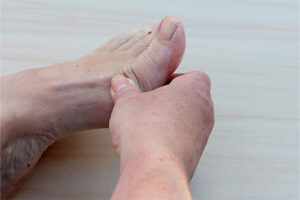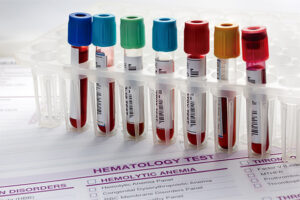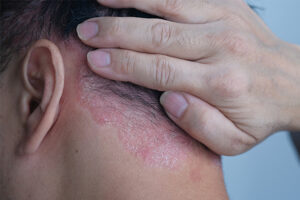Dermatology
Plaque Psoriasis
Addressing the Mental Health Burden of Plaque Psoriasis
Overview
The burden of plaque psoriasis may erode a patient's mental health, quality of life, and sense of well-being. Our featured expert considers the importance of addressing this burden, noting the treatment transformation that has occurred in recent decades.
Expert Commentary
Steven R. Feldman, MD, PhD
|
|
"When you have uncontrolled psoriasis, it can be socially disabling. This contributes to the mental health burden of the disease."
Mental health concerns are common in the United States. In general, many dermatology patients have depression, anxiety, or some other psychiatric comorbidity at baseline. Historically, the mental health burden of psoriasis was especially striking. Approximately 20 years ago, patients with psoriasis reported reductions in quality of life that were comparable to that observed in patients with other major chronic medical diseases, such as cancer, heart disease, and diabetes. And, although therapies have become more effective over the years, psoriasis is still associated with mental health burden.
How could the mental health burden of psoriasis be similar to that of diseases such as cancer or heart disease? Well, if you think of someone who has received a new cancer diagnosis, for instance, their friends and family often rally around them in support, providing them with both emotional support and day-to-day support such as bringing them meals. This usually does not happen for patients with psoriasis, whose unsightly lesions, scales, and odors may be repellent. When you have uncontrolled psoriasis, it can be socially disabling. This contributes to the mental health burden of the disease.
Psoriasis can affect many facets of life, including the clothing that patients wear. For example, patients may choose clothes that conceal their lesions. If they have scalp psoriasis, they may avoid dark-colored shirts and sweaters so that the scales do not appear as dandruff on their shoulders. Additionally, psoriasis in the intertriginous and genital areas is common and can have a big impact on patients psychosocially. It may be difficult for some people to even raise the issue of genital psoriasis with a physician, so asking about whether this is a concern for them can be important.
Screening for depression is needed in patients with psoriasis, just like it is in the setting of many other diseases. There might be visual cues from the patient during the visit, such as an avoidance of eye contact, a paucity of movement, or having low energy. This might prompt you to inquire about something innocuous such as their sleep habits; then you might expand your questions to explore the situation further, perhaps asking about their energy levels, their interest in activities, or any persistent sadness or crying. Although asking about suicidal ideation is key in determining whether a referral for an emergent mental health evaluation is needed, it may be best to ease into this question, starting with inquiries that are more benign (eg, questions about energy and sleep disturbance).
Importantly, psoriasis treatment has changed remarkably over the last few decades. When I was first starting out in the field, our treatments were not as effective, and sometimes the most important things I did for a patient were a lot of handholding and encouraging them to join the National Psoriasis Foundation so that they could be a part of a community of people with psoriasis and learn how other people manage the psychosocial implications of the disease. This organization still does important work; however, today, with the effectiveness of newer systemic psoriasis treatments, the majority of patients with psoriasis can become clear or almost clear. The best way to address the stigma of psoriasis may be to clear up the disease. Having little or no visible psoriasis is certainly a good outcome for patients.
References
Bell KA, Balogh EA, Feldman SR. An update on the impact of depression on the treatment of psoriasis. Expert Opin Pharmacother. 2021;22(6):695-703. doi:10.1080/14656566.2020.1849141
Blackstone B, Patel R, Bewley A. Assessing and improving psychological well-being in psoriasis: considerations for the clinician. Psoriasis (Auckl). 2022;12:25-33. doi:10.2147/ptt.S328447
Fabrazzo M, Romano F, Arrigo M, et al. A multivariate analysis of depression prevalence in psoriasis patients: a cohort study. Int J Environ Res Public Health. 2022;19(4):2060. doi:10.3390/ijerph19042060
Hawro T, Maurer M, Hawro M, et al. In psoriasis, levels of hope and quality of life are linked. Arch Dermatol Res. 2014;306(7):661-666. doi:10.1007/s00403-014-1455-9
Jalenques I, Bourlot F, Martinez E, et al. Prevalence and odds of anxiety disorders and anxiety symptoms in children and adults with psoriasis: systematic review and meta-analysis. Acta Derm Venereol. 2022;102:adv00769. doi:10.2340/actadv.v102.1386
Patel KR, Lee HH, Rastogi S, Singam V, Vakharia PP, Silverberg JI. Association of psoriasis with psychiatric hospitalization in United States children and adults. Dermatology. 2019;235(4):276-286. doi:10.1159/000499564
Rapp SR, Feldman SR, Exum ML, Fleischer AB Jr, Reboussin DM. Psoriasis causes as much disability as other major medical diseases. J Am Acad Dermatol. 1999;41(3 Pt 1):401-407. doi:10.1016/s0190-9622(99)70112-x
Schuster B, Peifer C, Ziehfreund S, et al. Happiness and depression in psoriasis: a cross-sectional study in Germany. Qual Life Res. 2022;31(6):1761-1773. doi:10.1007/s11136-021-02991-2
Zhang H, Yang Z, Tang K, Sun Q, Jin H. Stigmatization in patients with psoriasis: a mini review. Front Immunol. 2021;12:715839. doi:10.3389/fimmu.2021.715839











